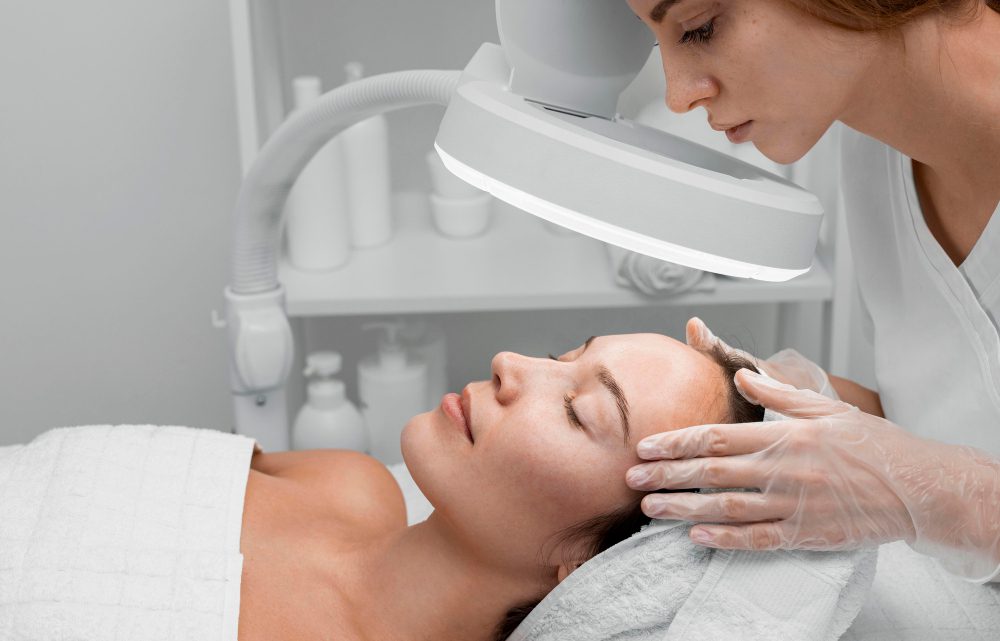Skin Diagnostics and Personalised Skincare: Revolutionising Dermatology with AI Technology
Introduction to AI in Dermatology
The Evolution of Dermatology
Dermatology has traditionally relied on the expertise of trained professionals to diagnose and treat skin conditions. Over the years, advancements in medical technology have enhanced diagnostic accuracy and treatment efficacy. However, the integration of artificial intelligence (AI) into dermatology marks a significant leap forward, offering unprecedented opportunities for innovation and improvement in patient care.
The Role of AI in Dermatology
AI technologies, particularly machine learning and deep learning, are transforming dermatology by enabling more precise and efficient skin diagnostics. These technologies can analyze vast amounts of data, including medical images, patient histories, and genetic information, to identify patterns and make predictions that might be challenging for human clinicians to discern.
Key Applications of AI in Dermatology
Skin Cancer Detection
AI systems have shown remarkable proficiency in detecting skin cancer, often matching or surpassing the diagnostic accuracy of dermatologists. By analyzing dermoscopic images, AI algorithms can identify malignant lesions with high sensitivity and specificity, facilitating early intervention and improving patient outcomes.
Personalized Skincare
AI-driven platforms are revolutionizing personalized skincare by analyzing individual skin types, conditions, and environmental factors. These platforms can recommend tailored skincare regimens and products, enhancing treatment effectiveness and patient satisfaction.
Predictive Analytics
AI can predict the progression of skin diseases and the potential response to treatments by analyzing historical data and identifying trends. This capability allows for more proactive and personalized patient management, reducing the likelihood of adverse outcomes.
Challenges and Considerations
Data Privacy and Security
The use of AI in dermatology raises concerns about data privacy and security. Ensuring that patient data is protected and used ethically is paramount to maintaining trust and compliance with regulations.
Integration into Clinical Practice
Integrating AI into clinical practice requires careful consideration of workflow, training, and acceptance by healthcare professionals. Ensuring that AI tools complement rather than replace human expertise is crucial for successful adoption.
Bias and Fairness
AI systems can inadvertently perpetuate biases present in training data, leading to disparities in care. Addressing these biases and ensuring fairness in AI-driven dermatology applications is essential for equitable patient outcomes.
The Evolution of Skin Diagnostics
Early Methods of Skin Examination
Visual Inspection
In the early days of dermatology, skin diagnostics primarily relied on visual inspection. Dermatologists used their trained eyes to identify and diagnose skin conditions based on appearance, texture, and color. This method, while foundational, was limited by the subjective nature of human observation and the variability in individual expertise.
Basic Tools and Techniques
The use of basic tools such as magnifying glasses and simple lighting techniques helped enhance visual inspection. These tools allowed dermatologists to examine skin lesions and abnormalities more closely, but they still lacked the precision and objectivity needed for accurate diagnosis.
Introduction of Dermoscopy
Advancements in Optical Technology
The introduction of dermoscopy marked a significant advancement in skin diagnostics. This non-invasive technique uses a dermatoscope to magnify and illuminate the skin, allowing for a more detailed examination of skin lesions. Dermoscopy improved diagnostic accuracy for conditions like melanoma by revealing structures and patterns not visible to the naked eye.
Impact on Diagnostic Accuracy
Dermoscopy significantly increased the accuracy of skin cancer diagnoses, reducing the number of unnecessary biopsies and improving early detection rates. This advancement represented a shift towards more objective and reliable diagnostic methods in dermatology.
Biopsy and Histopathological Analysis
The Gold Standard
Biopsy and histopathological analysis became the gold standard for definitive diagnosis of skin conditions. By examining skin tissue samples under a microscope, pathologists could identify cellular abnormalities and confirm diagnoses with high accuracy. This method provided a deeper understanding of skin diseases at the cellular level.
Limitations and Challenges
Despite its accuracy, biopsy is invasive and can be uncomfortable for patients. It also requires time for processing and analysis, delaying diagnosis and treatment. These limitations highlighted the need for less invasive and faster diagnostic methods.
Digital Imaging and Computer-Aided Diagnosis
Emergence of Digital Tools
The advent of digital imaging technologies revolutionized skin diagnostics by enabling the capture and analysis of high-resolution images of the skin. These tools facilitated the documentation and monitoring of skin conditions over time, providing a more comprehensive view of disease progression.
Role of Computer-Aided Diagnosis
Computer-aided diagnosis (CAD) systems began to emerge, leveraging algorithms to analyze digital images and assist dermatologists in identifying skin conditions. These systems improved diagnostic accuracy and consistency, offering a valuable second opinion in clinical practice.
Integration of Artificial Intelligence
Machine Learning and Deep Learning
The integration of artificial intelligence (AI) into skin diagnostics marked a new era in dermatology. Machine learning and deep learning algorithms were developed to analyze vast datasets of skin images, learning to recognize patterns and features associated with various skin conditions.
AI-Powered Diagnostic Tools
AI-powered diagnostic tools have the potential to outperform human experts in certain tasks, offering rapid and accurate assessments of skin conditions. These tools are particularly valuable in resource-limited settings, where access to dermatologists may be restricted.
Current Trends and Future Directions
Personalized Skincare Solutions
The evolution of skin diagnostics is now moving towards personalized skincare solutions. By combining AI with data from genetic, environmental, and lifestyle factors, dermatologists can offer tailored treatment plans that address individual patient needs.
Teledermatology and Remote Diagnostics
Teledermatology is gaining traction, allowing patients to receive expert skin assessments remotely. AI-driven platforms facilitate remote diagnostics, making dermatological care more accessible and convenient for patients worldwide.
How AI Technology Works in Skin Analysis
Image Acquisition and Preprocessing
AI technology in skin analysis begins with the acquisition of high-quality images of the skin. These images are captured using specialized cameras or smartphone applications that are designed to highlight various skin features such as texture, pigmentation, and vascular structures. Preprocessing techniques are then applied to these images to enhance their quality and ensure consistency. This may involve noise reduction, contrast enhancement, and normalization to prepare the images for further analysis.
Feature Extraction
Once the images are preprocessed, the next step is feature extraction. This involves identifying and isolating specific characteristics of the skin that are relevant for analysis. AI algorithms, particularly those based on deep learning, are employed to detect features such as wrinkles, pores, spots, and other dermatological markers. These algorithms are trained on large datasets to recognize patterns and anomalies in skin images, allowing them to extract meaningful features that can be used for diagnosis and treatment planning.
Machine Learning and Pattern Recognition
Machine learning models, especially convolutional neural networks (CNNs), play a crucial role in analyzing the extracted features. These models are designed to recognize complex patterns and correlations within the data. By training on vast amounts of labeled skin images, the AI system learns to differentiate between various skin conditions, such as acne, eczema, or melanoma. The pattern recognition capabilities of these models enable them to provide accurate and reliable assessments of skin health.
Predictive Analytics and Diagnosis
AI technology leverages predictive analytics to offer diagnostic insights based on the analyzed data. By comparing the extracted features and recognized patterns against a database of known skin conditions, the AI system can predict the likelihood of specific dermatological issues. This predictive capability allows for early detection of potential skin problems, enabling timely intervention and personalized treatment plans. The AI system can also provide recommendations for skincare products and routines tailored to the individual’s unique skin profile.
Continuous Learning and Improvement
AI systems in skin analysis are designed to continuously learn and improve over time. As more data is collected and analyzed, the algorithms refine their accuracy and expand their diagnostic capabilities. This continuous learning process is facilitated by feedback loops, where the outcomes of AI-driven diagnoses and treatments are used to further train and enhance the models. This ensures that the AI technology remains up-to-date with the latest dermatological research and trends, providing users with cutting-edge skin analysis and care solutions.
Personalized Skincare: Tailoring Treatments to Individual Needs
Understanding Skin Types and Conditions
Personalized skincare begins with a comprehensive understanding of an individual’s unique skin type and condition. Skin types can range from oily, dry, combination, to sensitive, and each type requires different care and treatment. Conditions such as acne, eczema, rosacea, and hyperpigmentation further complicate skincare needs. By accurately identifying these factors, skincare professionals can tailor treatments that specifically address the unique challenges and requirements of each individual’s skin.
The Role of AI in Skin Analysis
AI technology plays a crucial role in the personalization of skincare by providing precise skin analysis. Advanced algorithms can analyze high-resolution images of the skin to detect subtle changes and patterns that may not be visible to the naked eye. This technology can assess factors such as pore size, texture, hydration levels, and the presence of fine lines or wrinkles. By leveraging AI, dermatologists and skincare professionals can gain deeper insights into an individual’s skin health, leading to more effective and personalized treatment plans.
Customizing Skincare Products
Once a detailed skin analysis is conducted, the next step is to customize skincare products that cater to the individual’s specific needs. AI-driven platforms can recommend formulations that include the right combination of active ingredients, concentrations, and product types. For instance, someone with oily skin prone to acne might benefit from a regimen that includes salicylic acid and niacinamide, while someone with dry, sensitive skin might require products rich in hyaluronic acid and ceramides. This level of customization ensures that each person receives a skincare routine that is both effective and safe for their skin type and condition.
Monitoring and Adjusting Treatment Plans
Personalized skincare is not a one-time solution but an ongoing process that requires regular monitoring and adjustments. AI technology can track changes in the skin over time, allowing for the continuous refinement of treatment plans. By analyzing data from regular skin assessments, AI can suggest modifications to skincare routines, such as introducing new products or adjusting the frequency of use. This dynamic approach ensures that skincare treatments remain effective as the individual’s skin evolves due to factors like age, environment, and lifestyle changes.
Enhancing Patient Engagement and Education
Personalized skincare also enhances patient engagement and education. AI-powered apps and platforms can provide users with detailed insights into their skin health, empowering them to make informed decisions about their skincare routines. These tools can offer personalized tips, reminders, and educational content, helping individuals understand the importance of consistency and proper skincare practices. By fostering a deeper understanding of their skin, individuals are more likely to adhere to their personalized treatment plans, leading to better outcomes.
Benefits of AI-Driven Dermatology
Enhanced Diagnostic Accuracy
AI-driven dermatology significantly enhances diagnostic accuracy by leveraging machine learning algorithms trained on vast datasets of skin images. These algorithms can identify patterns and anomalies that may be imperceptible to the human eye, leading to more precise diagnoses. This capability is particularly beneficial in detecting early signs of skin cancer, such as melanoma, where early intervention is crucial. AI systems can compare a patient’s skin condition against millions of images, providing a level of diagnostic precision that surpasses traditional methods.
Personalized Skincare Recommendations
AI technology enables the development of personalized skincare regimens tailored to an individual’s unique skin type and condition. By analyzing data from various sources, including skin scans, lifestyle factors, and genetic information, AI can recommend products and treatments that are most likely to be effective for a specific person. This personalized approach not only improves treatment outcomes but also enhances patient satisfaction by addressing their specific skincare needs.
Increased Accessibility to Dermatological Care
AI-driven dermatology tools can increase accessibility to dermatological care, especially in underserved or remote areas. Mobile applications equipped with AI capabilities allow users to perform preliminary skin assessments using their smartphones. These applications can provide immediate feedback and suggest whether a professional consultation is necessary. This democratization of dermatological care ensures that more people have access to early detection and treatment, regardless of their geographical location.
Time and Cost Efficiency
AI technology streamlines the diagnostic process, reducing the time required for dermatological assessments. Automated image analysis can quickly process and evaluate skin conditions, allowing dermatologists to focus on more complex cases. This efficiency not only saves time for healthcare providers but also reduces costs for patients by minimizing the need for multiple consultations and unnecessary treatments. The integration of AI in dermatology practices can lead to more efficient resource allocation and improved patient throughput.
Continuous Learning and Improvement
AI systems in dermatology are designed to continuously learn and improve over time. As these systems are exposed to more data, they refine their algorithms, enhancing their diagnostic capabilities and treatment recommendations. This continuous learning process ensures that AI-driven dermatology remains at the forefront of medical advancements, adapting to new research findings and emerging skin conditions. The ability to evolve and improve makes AI a valuable tool in the ever-changing field of dermatology.
Challenges and Ethical Considerations
Data Privacy and Security
The integration of AI in skin diagnostics and personalized skincare necessitates the collection and analysis of vast amounts of personal data, including images and medical histories. Ensuring the privacy and security of this sensitive information is paramount. There is a risk of data breaches, unauthorized access, and misuse of personal data, which can lead to identity theft or discrimination. Companies must implement robust data protection measures and comply with regulations such as the General Data Protection Regulation (GDPR) to safeguard user information.
Bias and Fairness
AI algorithms are only as good as the data they are trained on. If the training data lacks diversity, the AI system may produce biased results, leading to inaccurate diagnoses or recommendations for certain demographic groups. This can perpetuate existing disparities in healthcare access and outcomes. It is crucial to ensure that AI models are trained on diverse datasets that represent various skin types, tones, and conditions to promote fairness and inclusivity in dermatological care.
Accuracy and Reliability
While AI has the potential to enhance diagnostic accuracy, there is still a risk of errors. Misdiagnoses can occur if the AI system misinterprets data or if the input data is of poor quality. Ensuring the reliability of AI systems is essential to prevent harm to patients. Continuous validation and testing of AI models, along with human oversight, are necessary to maintain high standards of accuracy and reliability in clinical settings.
Informed Consent
Obtaining informed consent from patients is a critical ethical consideration when using AI in dermatology. Patients must be fully aware of how their data will be used, the potential risks and benefits, and the limitations of AI technology. Transparent communication is essential to build trust and ensure that patients are making informed decisions about their healthcare.
Accountability and Liability
Determining accountability and liability in the event of an error or adverse outcome involving AI technology is a complex issue. It raises questions about who is responsible—the developers of the AI system, the healthcare providers using it, or the institutions that implement it. Clear guidelines and legal frameworks are needed to address these concerns and ensure that patients have recourse in case of harm.
Accessibility and Equity
The deployment of AI-driven skincare solutions may exacerbate existing inequalities in healthcare access. High costs and technological barriers can limit the availability of these advanced tools to certain populations, particularly in low-resource settings. Efforts must be made to ensure that AI technology is accessible and affordable to all, regardless of socioeconomic status, to prevent widening the gap in healthcare disparities.
Ethical Use of AI
The ethical use of AI in dermatology involves ensuring that technology is used to enhance patient care and not replace the human touch that is essential in healthcare. AI should be viewed as a tool to support clinicians, not as a substitute for professional judgment. Ethical guidelines should be established to govern the use of AI, emphasizing the importance of human oversight and the prioritization of patient welfare.
Case Studies and Real-World Applications
AI-Powered Skin Diagnostic Tools
Case Study: SkinVision
SkinVision is a mobile application that uses AI algorithms to assess skin lesions for potential skin cancer risks. The app allows users to take photos of their skin lesions, which are then analyzed using a deep learning model trained on a vast dataset of skin images. The AI provides a risk assessment, categorizing lesions as low, medium, or high risk. This tool has been particularly beneficial in regions with limited access to dermatologists, offering a preliminary screening that can prompt users to seek professional medical advice if necessary. Clinical studies have shown that SkinVision’s AI model achieves a sensitivity rate of over 95% in detecting melanoma, making it a reliable tool for early detection.
Case Study: DermaSensor
DermaSensor is a handheld device designed for primary care physicians to evaluate skin lesions. It uses spectroscopy and machine learning to analyze the cellular structure of the skin. The device provides an immediate assessment, indicating whether a lesion is likely benign or suspicious. This tool empowers general practitioners to make informed decisions about referrals to dermatologists, improving the efficiency of skin cancer screening processes. In real-world applications, DermaSensor has demonstrated high accuracy rates, significantly reducing unnecessary biopsies and ensuring timely intervention for suspicious cases.
Personalized Skincare Solutions
Case Study: Proven Skincare
Proven Skincare utilizes AI to create personalized skincare products tailored to individual needs. By analyzing a comprehensive questionnaire that includes factors such as skin type, environmental conditions, and lifestyle habits, the AI system formulates customized skincare regimens. Proven’s AI engine is built on a database of over 20,000 ingredients and 100,000 skincare products, allowing it to recommend formulations that address specific skin concerns. Users have reported significant improvements in skin health and appearance, highlighting the effectiveness of AI-driven personalization in skincare.
Case Study: Atolla
Atolla is a skincare company that leverages AI to develop personalized serums based on monthly skin assessments. Users complete a skin test at home, which measures various parameters such as oiliness, moisture levels, and pH balance. The data is then processed by Atolla’s AI platform, which adjusts the serum formulation to match the user’s current skin condition. This dynamic approach ensures that skincare products evolve with the user’s skin needs, providing a tailored solution that adapts to changes over time. Atolla’s model has been praised for its precision and adaptability, offering a unique and effective skincare experience.
AI in Dermatology Clinics
Case Study: IBM Watson in Dermatology
IBM Watson has been integrated into dermatology clinics to assist in diagnosing skin conditions. By analyzing patient data, medical history, and dermatological images, Watson’s AI system provides diagnostic suggestions and treatment recommendations. This application of AI supports dermatologists in making more accurate and informed decisions, enhancing patient care. In practice, clinics using IBM Watson have reported improved diagnostic accuracy and reduced time spent on routine assessments, allowing dermatologists to focus on complex cases and patient interaction.
Case Study: Google Health’s AI Dermatology Assistant
Google Health has developed an AI-powered dermatology assistant that can identify a wide range of skin conditions. The tool is designed to be used by both healthcare professionals and patients, providing a preliminary analysis based on uploaded images of skin issues. The AI model, trained on a diverse dataset of skin images, can recognize over 26 common skin conditions with high accuracy. In clinical settings, this tool aids dermatologists by offering a second opinion and helping prioritize cases based on severity. The real-world application of Google’s AI assistant has demonstrated its potential to streamline dermatological workflows and improve patient outcomes.
The Future of AI in Skincare and Dermatology
Advancements in AI Algorithms
AI algorithms are becoming increasingly sophisticated, enabling more accurate and efficient analysis of skin conditions. Machine learning models are being trained on vast datasets of skin images, allowing them to recognize patterns and anomalies with high precision. These advancements are paving the way for AI to assist dermatologists in diagnosing a wide range of skin conditions, from common issues like acne and eczema to more complex diseases such as melanoma. The continuous improvement of these algorithms will likely lead to faster diagnosis times and more personalized treatment plans.
Integration with Wearable Technology
The integration of AI with wearable technology is set to transform how individuals monitor their skin health. Wearable devices equipped with sensors can collect real-time data on various skin parameters, such as moisture levels, UV exposure, and temperature. AI can analyze this data to provide users with personalized skincare recommendations and alerts about potential skin issues. This real-time monitoring capability empowers individuals to take proactive steps in managing their skin health, potentially reducing the need for frequent dermatologist visits.
Personalized Skincare Solutions
AI is revolutionizing the development of personalized skincare products. By analyzing individual skin types, environmental factors, and lifestyle habits, AI can recommend tailored skincare regimens that address specific needs. This level of personalization extends to the formulation of skincare products, where AI can assist in creating custom blends that optimize ingredient efficacy for each user. As AI technology continues to evolve, the skincare industry is likely to see a shift towards more bespoke solutions that cater to the unique requirements of each consumer.
Enhanced Teledermatology Services
Teledermatology is experiencing significant growth, and AI is playing a crucial role in enhancing these services. AI-powered platforms can facilitate remote consultations by analyzing images of skin conditions and providing preliminary assessments. This capability not only improves access to dermatological care for individuals in remote or underserved areas but also streamlines the consultation process for dermatologists. As AI technology advances, teledermatology services are expected to become more accurate and efficient, offering a viable alternative to in-person visits.
Ethical and Regulatory Considerations
The increasing use of AI in skincare and dermatology raises important ethical and regulatory considerations. Ensuring the privacy and security of patient data is paramount, as is maintaining transparency in how AI algorithms make decisions. Regulatory bodies are likely to develop new guidelines to address these concerns, ensuring that AI applications in dermatology adhere to high standards of safety and efficacy. The ethical implications of AI-driven diagnostics and treatments will continue to be a focal point as the technology becomes more integrated into clinical practice.

Sarah Partridge, the visionary behind Boss Queen Aesthetics, has carved a distinctive niche in the beauty and aesthetics industry with her creative approach and dedication to client satisfaction. Based in Tamworth, UK, Sarah specialises in a range of beauty services, from dermal fillers and Anti-Wrinkle to bridal hair and makeup, embodying a versatile aesthetic that meets the needs of a diverse clientele.









